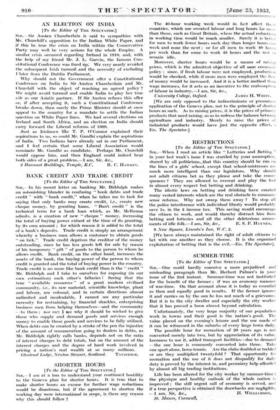AN ELECTION ON INDIA [To the Editor of THE SPiCTATOR1
Sin,—Sir Austen Chamberlain is said to sympathize with Mr. ChUrchill's opposition to the Indian White Paper, and' if this be true the crisis_ on India Within the Conservative Party may well be very serious for the whole Empire. A similar crisis occurred regarding Ireland in 1910; and, with the help of my friend Mr. J. L. Garvin, the famous Con- stitutional Conference was fixed tip: We 'very nearly avoided the subsequent Irish turmoil and the necessity of excluding Ulster from the Dublin Parliament.
Why should not the Government offer a Constitutional Conference on India to Sir Austen Chamberlain' and Mr. Churchill with the object of reaching an agreed policy ? We might avoid turmoil and enable India to play her true role as our Asiatic partner. If Sir Austen refuses this offer or, if after accepting it, such a Constitutional Conference breaks down, then surely the Prime Minister should at once appeal to the country for a mandate -to settle the Indian question on White Paper lines. We had several elections on Ireland and South Africa, and an election on India should carry forward the Liberal reforms of 1909.
Just as Irishmen like T. P. O'Connor explained their aspirations to us, so could Mr. Gandhi explain the aspirations of India. Two Indians have already sat in our Parliament, and I feel certain that some Liberal Association would nominate Mr. Gandhi as candidate. Perhaps Mr. Churchill would oppose him, and then England could indeed hear both sides of a great problem.-7-I am, Sir, &c., 2 Harcourt Buildings, Temple, E.C. B. C. HAWKIN.








































 Previous page
Previous page